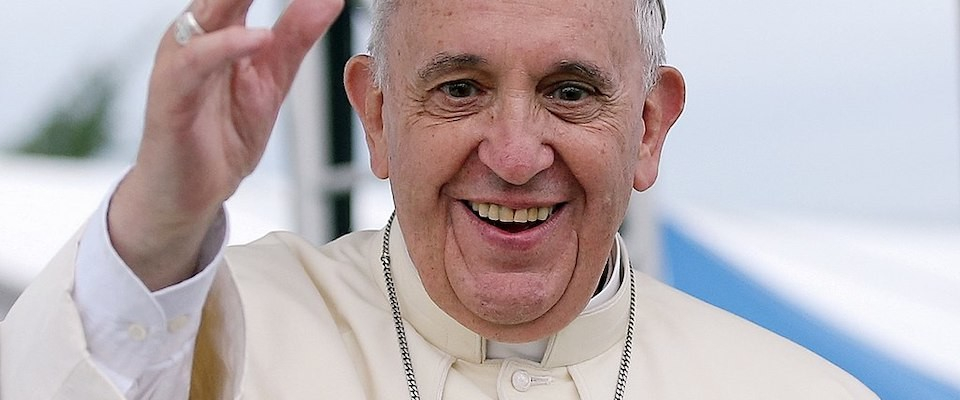
Published August 21, 2023
Why is he shouting at us?” It was an innocent question, whispered at Mass in the middle of an agitated Pope Francis homily. My wife had arrived in Rome from the States the evening before, just as the 2015 Synod on the Family closed. She was unaware of the synod’s tensions over the previous three weeks, which I’d seen firsthand assisting several delegates. She was also unaware of the pope’s rough final comments to the assembled bishops, men who had just given the better part of a month away from their dioceses to do the synod’s work. I should add here too that my wife is a hardcore Catholic “lifer,” a forty-year veteran Catholic educator, and the kind of woman who always loves the pope. Any pope.
Now, the morning after, we sat in St. Peter’s Basilica while the papal homily concluded. Whatever Francis said and no matter his intent that morning, how he said it was received as hectoring by many of those present. And hectoring doesn’t work. It doesn’t work with children, and even less so with adults.
Francis is a complex man. All humans are. But the strengths and weaknesses of a pope are magnified a hundredfold by the importance of his ministry and its global, very public stage. Francis’s love for the poor and marginalized is heartfelt and compelling. So too is his focus on mercy and accompaniment. His public warmth and openness appeal to many persons otherwise alienated from the Church. For many, both inside and outside the Catholic world, his informality serves as a healthy counterweight to his more intellectually inclined predecessors. And a decade into his tenure, his 2013 apostolic exhortation, The Joy of the Gospel, is still an exhilarating read, filled with inspiring content and surpassed only by his first encyclical, Light of Faith.
He can also be a man with a quick temper and peremptory manner. Jesuit popes may not be the ideal option for the Church going forward. The command structure of the Society of Jesus may work well for the order’s mission. Not so much for the Church at large.
A happy marriage, for example, includes plenty of blunt talk, disagreement, and sometimes painful listening. The mutual obedience of mature spouses is never a form of servility. It always involves honest criticism, motivated by love but delivered with candor. A father’s refusal to listen to reasonable criticism and adjust his leadership accordingly is a good way to poison the relationship with his wife and harden the resentments of his children. Yet there are moments when many of the current pontificate’s supporters seem oblivious to Ephesians 6:4, especially “Fathers, do not provoke your children to anger,” the better to “bring them up in the discipline and instruction of the Lord.”
Critics are not always enemies. Some speak out of love, even when their words are heated.
Pope Francis’s distaste for the United States is not well disguised. As an American, I find that unfortunate, but also understandable. Washington has a long and often ugly record of interference in Latin American affairs. As an American Catholic, I wish he had more trust in our bishops, overwhelmingly faithful men, and more sensitivity to the intense challenges the American Church now faces. I also think the pope’s China policy is gravely unwise. But the Church has often played the long game successfully, so yes, I could be wrong.
What I’m not wrong about is the curious nature of the pope’s recent interview with the Spanish-language platform Vida Nueva, as reported here. The report is worth reading. Francis has a gift, intentional or otherwise, for unhelpful generalities. He suggests that a Vatican III would be premature because “Vatican II still has not been implemented.” That would be news to his two predecessors (three counting Paul VI) who, unlike Francis, actually attended the council and labored mightily—along with a great many other people, not all of them acceptably “progressive”—to incarnate its teachings in the life of the Church. Francis worries about corrupt restorationists, “right-wing ideologies,” and priests who go into neighborhoods to “dogmatize.” But they’re hardly the most dangerous problems facing the Church. Western civilization is drowning in elitist scientism, economic inequities, sexual anarchy, crackpot transhumanist dreaming, and assaults on marriage, family, and biblical anthropology. These might warrant some priority. And the unnamed “prophets of confusion” the pope mentions in his interview as undermining the mission of the Church might be found quite generously even among some of the Holy Father’s loudest supporters.
Again: Critics, real and perceived, are not always enemies. Some are wrongfully provoked. Fidelity is not automatic agreement. Obedience is not unthinking submission. And being a “stone in the shoe,” as the Holy Father regrettably describes himself, is not always a virtue. It can also, sometimes, be the opposite.
Francis X. Maier is a senior fellow in Catholic Studies at the Ethics and Public Policy Center.
Francis X. Maier is a Senior Fellow in the Catholic Studies Program at the Ethics and Public Policy Center. Mr. Maier’s work focuses on the intersection of Christian faith, culture, and public life, with special attention to lay formation and action.











